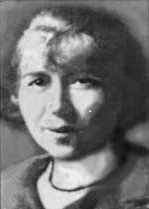Miriam Ulinover
Miriam Ulinover | |
|---|---|
מרים אולינאָװער | |
 | |
| Born | Manya Hirshbeyn 22 February 1890 |
| Died | 18 August 1944 (aged 53–54) |
| Occupation | Poet |
| Years active | 1905–1944 |
Manya Hirshbeyn (Yiddish: מרים אולינאָװער; 22 February 1890–18 August 1944), known primarily as Miriam Ulinover or Miryem Ulinover, was a Yiddish-language poet. She is regarded for her folkloristic style and for being one of few religious and Orthodox Jewish women poets of her time.
Personal life[edit]
Ulinover was born on 22 February 1890[1] in Łódź to parents Shimen and Sheyndl (née Gerzon) Hirshbeyn. Her parents divorced in 1905.[2][3] She spent some of her childhood with her maternal grandfather, Talmudic scholar Shaye Gerzon, in the shtetl Krzepice (near modern-day Częstochowa, Poland). Ulinover, however, lived for the majority of her life in Łódź.[3]
Writing career[edit]
Sholem Aleichem inspired Ulinover to start writing when he met her in Łódź in 1905.[2][3][4] Ulinover is known for writing folk poetry and is renowned for being one of few religiously observant Jewish women to write poetry.[5]
Ulinover’s deliberately archaic language … contributed to an unusual statement of the modern. With an urge to preserve the ephemeral oral culture of the Jewish folk, and particularly of women, Ulinover created a new cultural artifact, the literary folk poem. Through the dialogue between a modern granddaughter and her old-fashioned grandmother, Ulinover introduced a specifically female voice into modern Yiddish poetry.
— Kathryn Hellerstein, A Question of Tradition: Women Poets in Yiddish, 1586-1987, chapter 4: The Folk and the Book
Some of Ulinover's poetry was featured in Ezra Korman's 1928 collection of Yiddish women poetry titled Yidishe dikhterins (Yiddish: ייִדישע דיכטערינס, lit. 'Yiddish Women Poets').[1]
In 1922, Ulinover published her own book of poetry with the help of David Frischmann, titled Der bobes oytser (Yiddish: דער באָבעס אוצר, lit. 'The Grandmother's Treasure').
Literary gatherings[edit]
Before the war, Ulinover started a salon, bringing other renowned Yiddish writers to her home. Some of her interlocutors included Chaim Leib Fox, Rikuda Potash, Mirl Erdberg-Shatan, Simkha-Bunim Shayevitsh, Yeshayahu Shpigl, Alter Shnur, Yerakhmiel Briks, and Yitskhok Goldkorn. After being interned in the Łódź Ghetto in 1940, she continued to host her literary gatherings.
Death and legacy[edit]
On 18 August 1944, Ulinover was deported to Auschwitz upon the Łódź Ghetto's liquidation. She was gassed a few days later. While it is believed that she continued to write in the ghetto, many of her manuscripts are reported to have been lost during the Holocaust.[3]
References[edit]
- ^ a b "4. The Folk and the Book: Miriam Ulinover and Roza Yakubovitsh", A Question of Tradition, Stanford University Press, pp. 169–242, 2020-12-31, doi:10.1515/9780804793971-006, ISBN 978-0-8047-9397-1, retrieved 2022-06-16
- ^ a b "YIVO | Ulinover, Miryem". yivoencyclopedia.org. Retrieved 2022-06-16.
- ^ a b c d "Miryam Ulinover". Jewish Women's Archive. Retrieved 2022-06-16.
- ^ "צוויי לידער | Two Poems". In geveb. Retrieved 2022-06-16.
- ^ Lisek, Joanna (2020). "ACADEMIA - The magazine of the Polish Academy of Sciences". doi:10.24425/ACADEMIAPAS.2020.135920.
{{cite journal}}: Cite journal requires|journal=(help)
